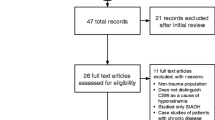Summary
Forty-six consecutive patients with severe isolated head trauma (GCS ⩽ 7) had significant hypokalaemia averaging 3.1±0.4 (S.D.) mmol/litre upon admission to the emergency room. This electrolyte imbalance occurred within hours of the trauma and resolved under treatment within the first day. There was no correlation between serum potassium and pH, glucose, urine electrolytes, patient age or sex, admission Glasgow Coma Score or the Glasgow Outcome Score.
Sixteen patients with multiple trauma but without head trauma had an average serum potassium of 3.5±1.1 mmolar.
Mechanisms of serum potassium level control and their correlation with brain trauma are addressed in a search for an explanation of this phenomenon. We believe that the most appropriate explanation for this hypokalaemia is the large catecholamine discharge that is known to accompany severe head trauma, with resultant beta2 adrenergic stimulation of the Na+-K+ pump. The formation of a prospective on-going study to clarify the basic mechanism of hypokalaemia in severe head trauma is presented.
Similar content being viewed by others
References
Askari A, Long CL, Blakemore WS (1982) Net metabolic changes of zinc, copper, nitrogen, and potassium balances in skelet al trauma patients. Metabolism 31: 1185–1193
Brown MJ, Brown DC, Murphy MB (1983) Hypokalaemia from beta-2-receptor stimulation by circulating epinephrine. NEJM 309: 1414–1419
Clausen T (1983) Adrenergic control of Na+-K+-homeostasis. Acta Med Scand [Suppl] 672: 111–115
Clifton GL, Robertson CS, Kyper K, Taylor AA, Dhekne RD, Grossman RG (1983) Cardiovascular response to severe head injury. J Neurosurg 59: 447–454
Clifton GL, Ziegler MG, Grossman RG (1981) Circulating catecholamines and sympathetic activity after head injury. Neurosurgery 8: 10–14
Cruickshank JM, Neil-Dwyer G, Stott AW (1974) Possible role of catecholamines, corticosteroids, and potassium in production of electrocardiographic abnormalities associated with subarachnoid haemorrhage. Br Heart J 36: 697–706
Epstein FH, Rosa RM (1983) Adrenergic control of serum potassium. NEJM 309: 1450–1451
Hamill RW, Woolf PD, McDonald JV, Lee LA, Kelly RN (1987) Catecholamines predict outcome in traumatic brain injury. Ann Neurology 21/5: 438–443
Manary MJ, Keating JP, Hirshberg GE (1986) Quadriparesis due to potassium depletion. Crit Care Med 14: 750–752
Marion DW, Segal R, Thompson ME (1986) Subarachnoid haemorrhage and the heart. Neurosurgery 18: 101–106
Morgan DB, Young RM (1982) Acute transient hypokalaemia: new interpretation of a common event. Lancet 2: 751–752
Pentelenyi T, Kammerer L, Stutzel M, Balazsi I (1979) Alterations of the basal serum insulin and blood glucose in braininjured patients. Injury 10: 201–208
Pomeranz S, Constantini S, Rappaport ZH (1987) Hypopotassemia in severe head trauma. 8th European Congress of Neurosurgery, p 136 (abstract)
Reisin L, Landau A (1987) The idiopathic prolonged Q-T syndrome and hypokalaemia. Harefuah 32: 220–222
Rosa RM, Silva P, Young JB (1980) Adrenergic modulation of extrarenal potassium disposal. NEJM 302: 431–434
Shires GT, Canizaro PC, Carricao CJ (1984) Shock. In: Schwartz ST, Shires GT, Spencer FCet al (eds) Principles of surgery, Fourth Edition. McGraw-Hill Book Company, New York, p 122
Thier SO (1986) Potassium physiology. Am J Med 80 [Suppl 4A]: 3–7
Williams ME, Gervino EV, Rosa RM, Landsberg L, Young JB, Silva P, Epstein FH (1985) Catecholamine modulation of rapid potassium shifts during exercise. NEJM 312: 823–827
Williams ME, Rosa RM, Silva P, Brown RS, Epstein FH (1984) Impairment of extrarenal potassium disposal by alpha-adrenergic stimulation. NEJM 311: 145–149
Author information
Authors and Affiliations
Rights and permissions
About this article
Cite this article
Pomeranz, S., Constantini, S. & Rappaport, Z.H. Hypokalaemia in severe head trauma. Acta neurochir 97, 62–66 (1989). https://doi.org/10.1007/BF01577741
Issue Date:
DOI: https://doi.org/10.1007/BF01577741




